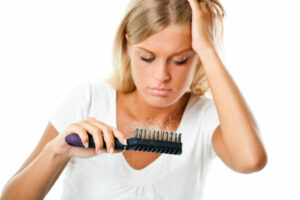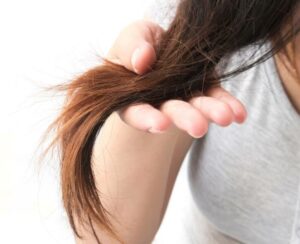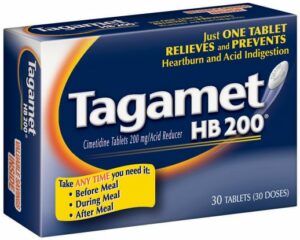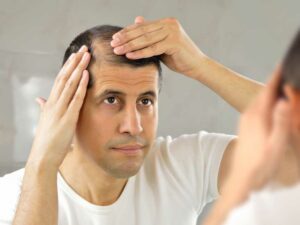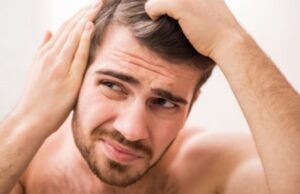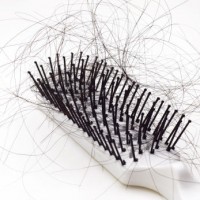
Looking in the mirror had become a difficult experience for Janet. It seemed like every day her forehead receded further and her already thinning hair became thinner. Feeling like everyone might be criticizing her appearance she became embarrassed to go out and worried what might be causing her hair loss. Her husband Thomas had many of the same concerns. Only 42, he had noticeable baldness.
Janet and Thomas are not alone in their experiences. By age 40, two-thirds of Caucasian men are noticeably bald. While many people wrongly assume hair loss is a men’s disease, one in four women experiences some degree of unnatural hair loss in her lifetime. But being in good company may not ease your mind about the causes of hair loss and what you can do to slow it down or halt it.
Hair loss of about 50 to 100 strands daily is normal. There can be many factors linked to accelerated hair loss, including: medications and chemotherapy, genetics, fad diets, chronic stress, hormonal imbalances, nutritional deficiencies, and poor scalp circulation.
Addressing Lifestyle-Related Hair Loss
Before panicking about your hair loss, talk to your pharmacist about the side-effects of any pharmaceutical drugs you may be taking. Many medications are linked with hair loss. If your hair loss started after a low calorie or low fat diet, you may wish to rethink your dieting strategy. Weight loss programs should not result in hair loss; instead, choose a healthier, nutritionally-sound approach. Chronic stress or serious illness can be linked to hair loss. Make a serious effort to reduce stress in your life and incorporate stress-reduction techniques, such as yoga, deep breathing, or meditation, into your daily routine.
Hormonal Imbalances
After genetics, hormonal imbalances are a primary culprit in hair loss. Excessive production of the hormone dihydrotestosterone (DHT) within the hair follicle appears to accelerate hair loss. DHT is driven by an enzyme called 5-alpha reductase, which is produced in the prostate, adrenal glands or scalp. Japanese researchers also link excessive sebum production in the scalp to high levels of 5-alpha reductase. Their research indicated that animal fat intake may increase sebum production. Reducing consumption of hydrogenated and saturated fats, along with refined sugar and flour, and processed foods may be helpful to reduce hair loss.
A study in the Journal of Alternative and Complementary Medicine reported that saw palmetto (serenoa repens) may increase hair growth in men. Hair growth improved in men taking 400 mg of a standardized extract of saw palmetto and 100 mg of beta-sitosterol (from saw palmetto) daily. Historically, saw palmetto has been used by herbalists for hair loss in both men and women.
An underactive thyroid gland (hypothyroidism) can cause thinning hair. Adding sea vegetables like kelp, nori, dulse, kombu, and wakame, all of which are rich in iodine may be helpful to balance this condition. Avoid drinking tap water since it typically contains fluorine and chlorine, two chemicals that inhibit iodine absorption. You may also want to supplement with 100 mg or 1 mL of the herb bladderwrack (focus vesiculosus) daily. Medium-chain triglycerides found in coconut oil and coconut milk can help reset the thyroid gland as well.
Many menopausal women often experience thicker hair with the use of natural progesterone to help balance hormones.
Nutritional Deficiencies
Be sure to eat varied, well-rounded, and regular meals that include plenty of vegetables, beans, nuts, fish, and lean poultry. Essential fatty acids from walnuts, flaxseeds, fish, and avocado are also important for healthy hair.
Biotin encourages hair and scalp health. Dietary sources of biotin include: nuts, brown rice, and oats. Iron is also essential for hair growth and can be found in blackstrap molasses, green leafy vegetables, leeks, cashews, dried fruits, figs, and berries. To help your body absorb iron, you’ll need vitamin C, which you can obtain from citrus fruits, strawberries, and red peppers.
Take a broad spectrum enzyme supplement with meals to assist digestion and absorption of nutrients.
A B-complex vitamin (50 mg, twice daily) can help reduce the effects of stress and contribute to healthy hair. Additional sublingual B12 may be needed to prevent hair loss. Take 200 to 400 mcg daily.
The minerals silica and zinc are also critical for hair growth. Take 500 mg of silica two times daily and 30 mg of zinc once daily.
Scalp Circulation
Rosemary essential oil has been traditionally used to increase circulation to the scalp. Add a few drops per dollop of shampoo or conditioner.

